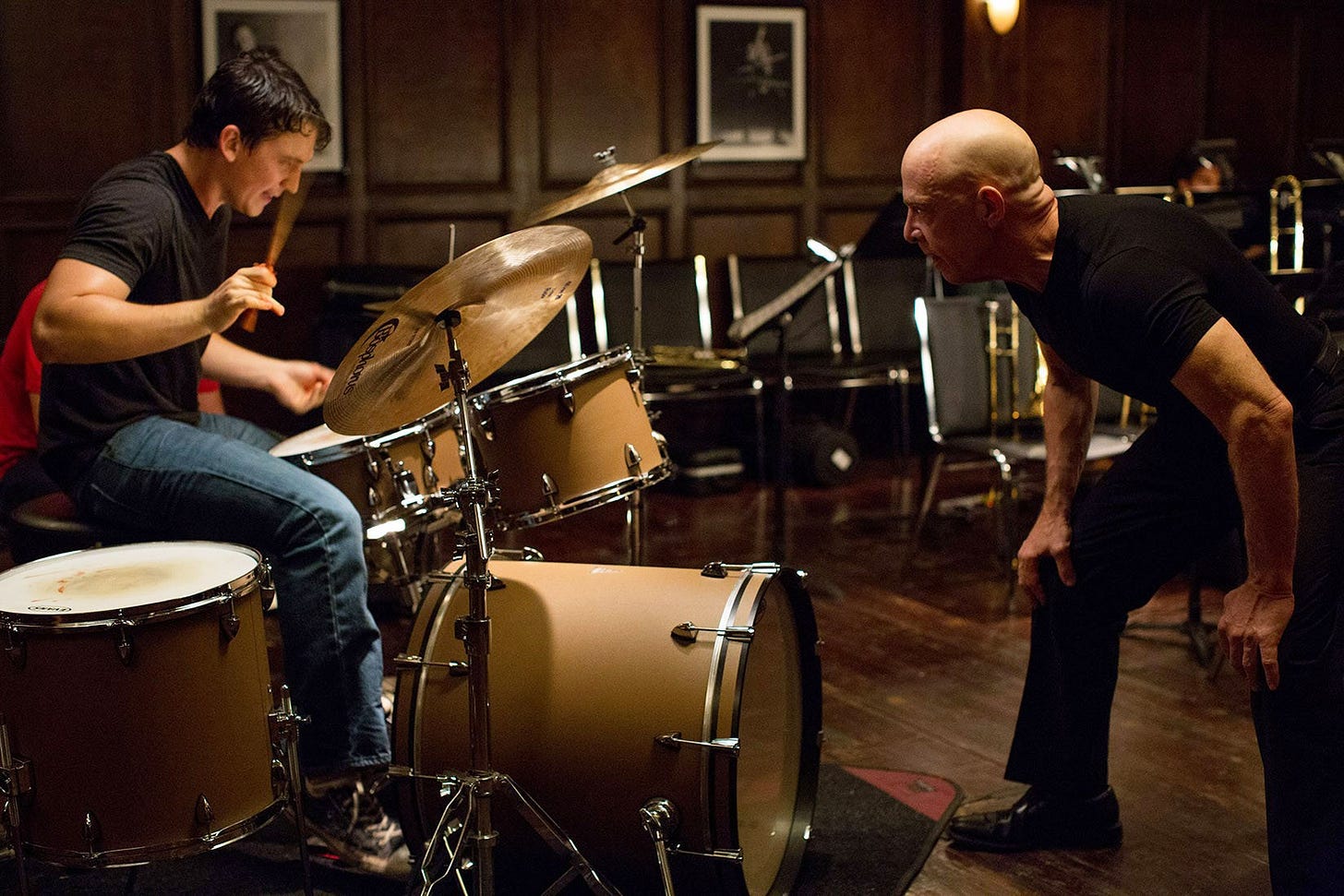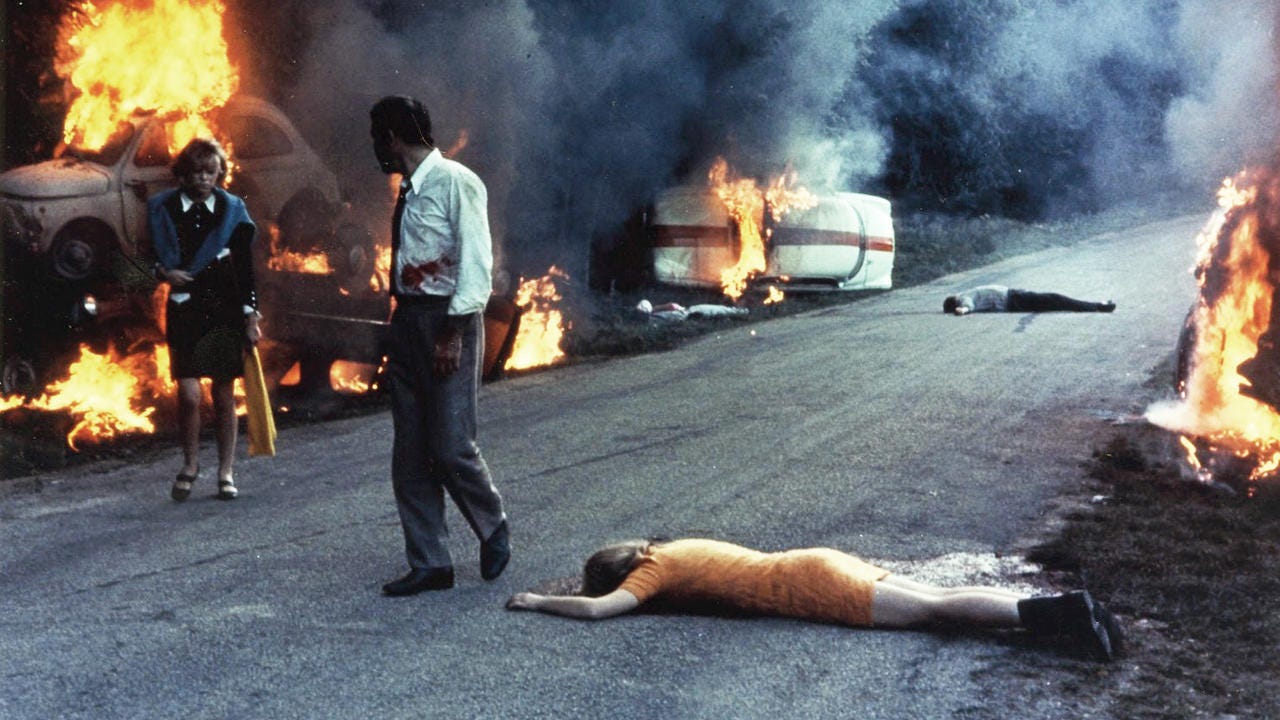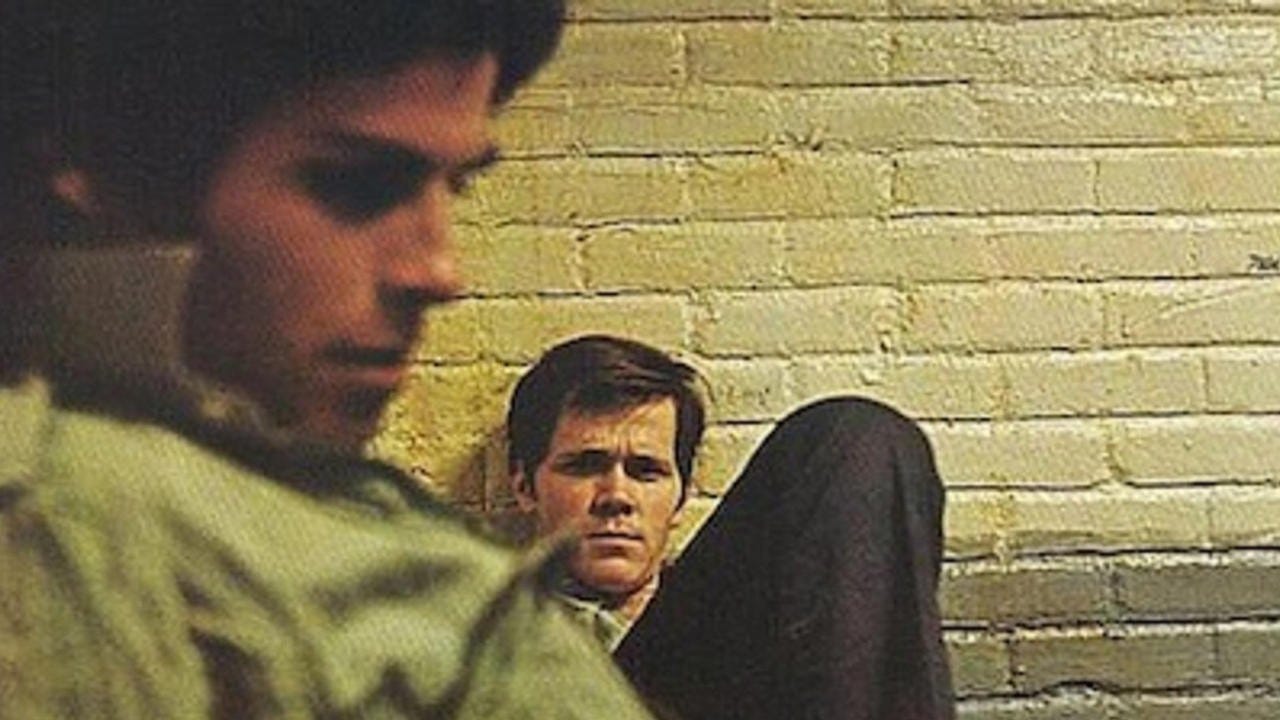Weekend Whiplashings of a Married Woman, Weekly Reel #41
I revisit Chazelle’s film, Whiplash, ahead of his upcoming release, talk about a pair of Godard films from different moments in his career, and pass on an old prison flick.
News of the Week: I’ve been reading Godard’s biography and watching a lot of his films, so that means I’ll write up a longish post on him, his films, his legacy, etc. It won’t come very soon, but it’ll come eventually (and probably before my first installment on the Bond franchise).
Watch Now
Whiplash (2014, Damien Chazelle, USA) should be on everyone’s (re)watch list in preparation for Chazelle’s upcoming release, Babylon. Whiplash is about a nineteen year old, Andrew (Miles Teller), who’s trying to become the Charlie Parker of jazz drummers attending a prestigious music conservatory. While practicing one evening, Terence Fletcher (J.K. Simmons, who won an Oscar for this role), the merciless instructor of the school’s top jazz group, notices Andrew’s talent and offers him a position in his band after interrupting the lower division jazz band the next day. The rest of the plot plays out as a ruthless game of insults, emotional distress, thrown chairs, and lower-skilled blackmail to test and recognize Andrew’s ability for greatness. Although the film is now eight years old, I’d rather not spoil it for you slackers. The final scene is one of the greatest filmed scenes by any under-thirty filmmaker with its electrical highs and lows that cements the tension of the previous hundred minutes.
Damien Chazelle grew up playing the drums but wasn’t so enthusiastic after having a Fletcher-like music instructor in high school. He was passionate about filmmaking, which got him to Harvard where he met his roommate, Justin Hurwitz, the future composer of all of Chazelle’s films. Chazelle made Guy and Madeline on a Park Bench for his senior thesis, along with Hurwitz, which earned them decent festival circuit play. Soon after, Chazelle moved to LA to make a musical but had to spend a few years as a writer-for-hire. While writing the script, his writer’s block led him to write another story based on his drummer schooldays that was more personal. That script became one of the top entries in the Black List, a Hollywood list of the “best” unfilmed screenplays. A couple of production studios gave Chazelle enough funds to complete it as a short film, also called Whiplash, as proof-of-concept. That short film performed well at Sundance, which attracted investors to fund its feature-length version. Although Chazelle had made a film for his senior thesis, Whiplash introduced him to the film community with its frenetic drum riff of style and won three Oscars (supporting actor, editing, and sound mixing). The critical and financial success then led to Chazelle’s ability to raise enough money for La La Land, then First Man, and the soon-to-be-released Babylon.
With a relatively small budget, Chazelle was able to create an enduring film and career that will allow him to explore different artistic and commercial projects from various industry paths. Also, and along with La La Land, he created films that made jazz accessible. Whiplash heavily relies on tempo, rushing v. dragging, and other jazz cues, yet we’re still engrossed in the action. And by the time one reaches the final scene, it doesn’t matter if one knows how a conductor and drummer lead the group’s time. That’s not nothing. La La Land goes a step further by being both jazz and a musical, the film genre as dead as jazz.
Whiplash is available on Peacock and Showtime. If neither are available, then paying four dollars for a rental is worth it.
Save for Later
A Married Woman (fr. Une femme mariée, 1964, Jean-Luc Godard, France) was Godard’s (rip) eighth feature film in five years. Between the time of his first, Breathless, in 1960, Godard had met, married, and split up with his first wife Anna Karina (also rip). According to Richard Brody, the New Yorker film critic and author of Godard’s biography, A Married Woman is Godard’s critique of a modern world that made it plausible for Karina to leave him. Like with his other films in this period, they’re intensely personal documents of his own life on screen. In Contempt, we watch the dissolution of a marriage that punished the fleeing wife with death. By the time A Married Woman was released the following year, Godard was criticizing the world around him for allowing a timeline in which his divorce could happen.
A Married Woman is about a woman, Charlotte (Macha Méril), who’s planning to divorce her husband and have a family with her lover. Her husband, a pilot, returns one day, they spend the day with their young daughter, and then romp around the apartment. Charlotte is too nervous to ask for a divorce. The next day, her husband flies off and she rendezvous with her lover, who’s at an airport hotel waiting for his flight to Marseille. She questions him about love but is unsatisfied with his responses. At the very end, to mark the end of the film and their relationship, she says, “c’est fini.” The film is fragmented and unfair for Charlotte, who feels shackled to her lover. She’s pushed towards divorce but doesn’t really want it. Again, Godard is, in a way, justifying Karina’s departure, which happened because, to him, a lover forced it against her will. By the end Charlotte liberates herself and reaches a level of self-awareness previously unavailable to her. (If only it was that simple Godard!)
The film also marked one of Godard’s first turning points in his exceptionally long career of turning points. Before, Godard’s films were almost entirely based on his own life with Karina and/or plays on classic Hollywood genres. After, Godard recognized, along with Michelangelo Antonioni, that modern society was alienating and should be re-approached through a socio-political engagement. But those films would come several years later. There’s much to say about Godard and his legacy, which will be coming in a standalone post sometime (hopefully before 2023). If you’re interested, you can watch A Married Woman on Kanopy for free if you aren’t subscribed to Mubi.
Weekend (1967, Jean-Luc Godard, France) is another Godard (rip) film I needed to catch up on while reading his biography. This film came during Godard’s transitionary period between films with stories to ones of Maoist propaganda or documentary-like innovations in film style. It’s about a middle-class couple that are rushing home before the wife’s mother dies and her stepfather disinherits them from the will. The wife has a lover that says she’ll leave her husband as soon as she gets her money, which combines Godard’s two favorite scenarios: sociopolitical immorality via bourgeois consumerism and marital infidelity. But from the start of the trip, the couple is tested with absolute chaos that breaches the limits of society and enters realms of abstraction that only Godard could achieve.
It would be impossible to sum up all the action that occurs, but here are the greatest hits: the most famous scene (that all film students watch completely out of context) is a looooong traffic gag of a standing-still traffic jam on a rural two-lane highway that the couple cut through and shows people picnicking, others arguing with each other or throwing a ball back and forth, and a deadly crash at the beginning of it that’s nonchalantly passed by; the couple are robbed and chased around by a couple of vagrants; they crash the car in a fiery wreck and proceed on foot; they hitchhike on a trash truck where a North African and Sub-Saharan African give lectures on their exploitation by Westerners; and the couple are abducted by a group of cannibal hippies that kill and roast the husband while the wife becomes the leader’s lover. And then the film kind of ends.
The film articulates a mountain of cultural references, from Dumas to Brontë to Mozart that is supposed to create something “closer to a cry,” in his words, than a film. The couple passes a dozen bloody car crashes, a stand-in for the vanity and cruelty of the bourgeoisie who pass by without a thought. For Godard, his world of France as well as cinema was reaching an end, which culminated the following year with May 68 and Godard’s rejection of traditional storytelling. Weekend ends with the title cards, “end of story” and “end of cinema.” And after the filming ended, Godard told his regular group of filmmaking collaborators to find work elsewhere.
Although I find the films of these years hard to watch and recommend, this film is funny and ridiculous in its absurdity and the politics can’t quite ruin it. If it sounds appetizing to you, it’s available on HBO Max.
Pass
Fortune and Men’s Eyes (1971, Harvey Hart, USA) is a film that has aged sideways since its release. It’s about a young man that’s sent to prison for six months, who becomes the raped servant of his cellmate until resisting him and becoming a dominant player himself. The film has noble intentions. It started as a play written by John Herbert, who wrote the story after being attacked outside a gay bar in the forties for wearing drag and sent to prison for indecency. He wrote himself into the story through the character of Queenie, the exaggerated and most flamboyant character in the story who’s presumably a homosexual acting as a transsexual. The prison has layers of “politicians,” meaning if you become the dominant aggressor or their plaything, then you’ll receive favorable treatment from the rest of the prisoners.
The film will certainly offend those triggered by gay slurs, but what I find dated is the concept of anal rape in prison, which is nowadays a trite schoolchild taunt. (I’m thinking of Kevin from “The Office” telling Oscar he’ll love prison *wink wink*.) I watched the film at the New Bev as part of Tarantino’s book tour, which shows a lot of films he wrote about. I wouldn’t recommend the film anyway, but it seems to be unavailable to stream (unless you like 360p DVD rips on YouTube).
Thank you once again for checking out my Substack. Hit the like button and use the share button to share this across social media. And don’t forget to subscribe if you haven’t already done so.







